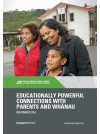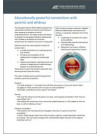Parents, families and whānau want their children to feel they belong at school and experience success. They want to be involved in their child’s learning – to understand what is expected and to know how they can contribute. This involvement contributes to each child’s learning and success and is vital for children at risk of not achieving.
ERO evaluated how well schools worked with parents, families and whānau in their response to students at risk of underachievement. ERO looked for stories about successful working relationships where schools, with parents, had helped students move onto a successful pathway from a less successful one. This evaluation was undertaken in 256 schools reviewed in Terms 3 and 4, 2014.
Key Results
Educationally powerful connections are relationships between schools, parents, whānau and communities that improve education outcomes for students. ERO found that such connections involved two-way collaborative working relationships that reflected the concept of mahi tahi – working together towards the specific goal of supporting a young person’s success. The best examples were learning-centred collaborations between students, their teachers and their parents and whānau that focused on the students’ learning and progress. A whānau-like context was established in which parents, teachers and students all understood their rights and responsibilities, commitments and obligations – whanaungatanga – to help the students succeed.
Although all schools had some type of relationship with children’s parents and whānau, many teachers worked more closely with parents of the students that needed support to catch up with their peers. In some schools, teachers shared resources or strategies that parents and the child could do together at home. In the best instances, teachers and leaders had a two-way learning relationship with parents and whānau where they shared solutions and listened to each other’s perspectives. As a result, many students made accelerated progress.
The intent of the relationship is to extend learning opportunities
The ‘tipping point’ for leaders and teachers creating educationally powerful connections and relationships with parents and whānau was for teachers and leaders to understand that the purpose of these relationships was to extend learning across home and school. Students then experienced multiple and aligned opportunities to learn and practise. Instead of one-off school based learning, learning at home was actively promoted by giving students relevant learning opportunities and support. They made sure the same language and resources were used in meaningful home and school activities to reinforce key learning. This enabled students to accelerate their progress and achieve success.


